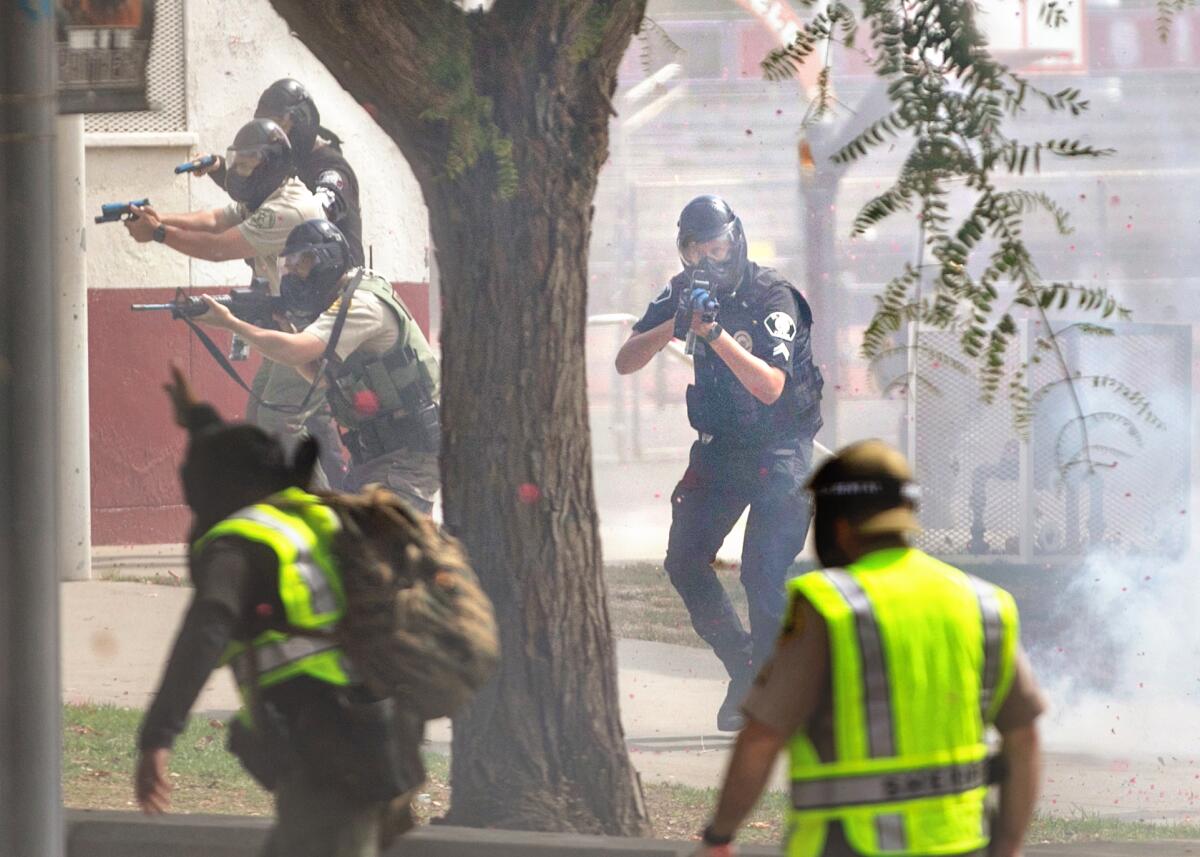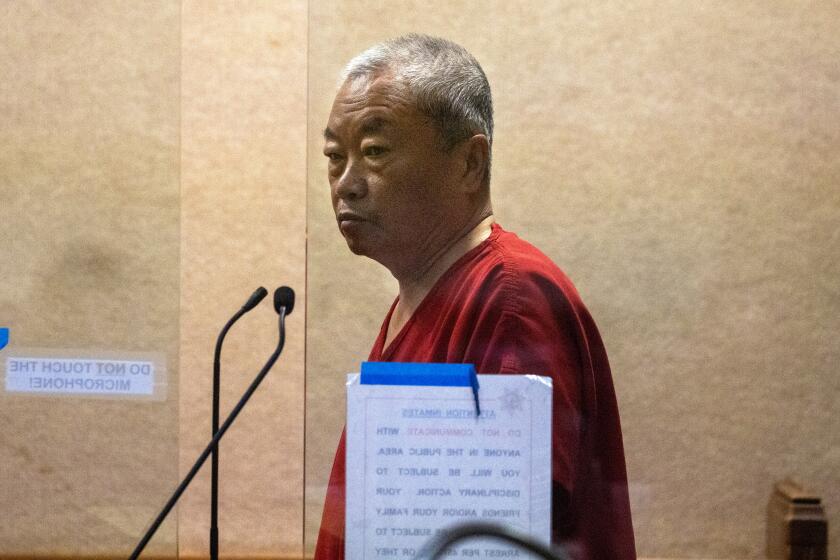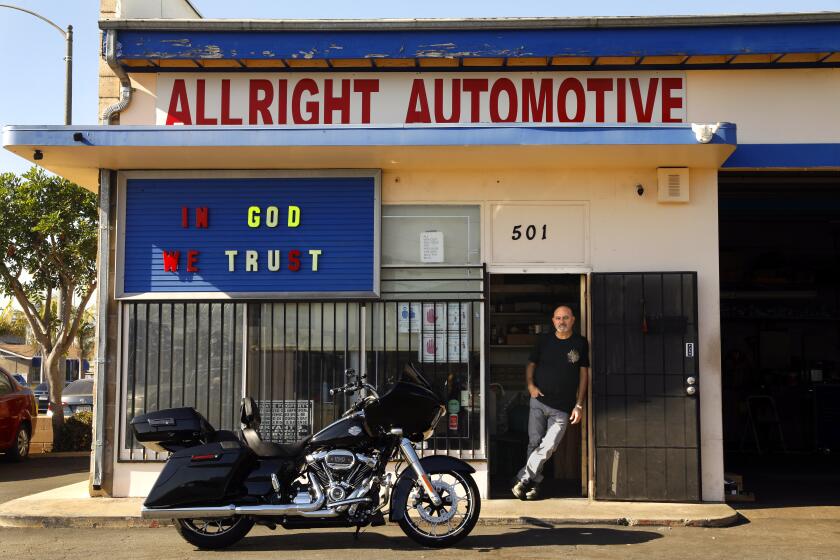California bill calls for violence prevention plan, security; opponents say it hurts small businesses

So much blood was strewn across the Santa Clara Valley light rail work yard in San Jose that state Sen. Dave Cortese placed booties over his work shoes to inspect the scene.
Concerns churned in Cortese’s mind hours after the May 26, 2021, mass shooting — the Bay Area’s most violent in a generation: Could this have been prevented? What were the protocols for dealing with this type of emergency and how could workers have been better protected?
A disgruntled former rail employee armed with three semiautomatic pistols killed nine co-workers before turning one of the weapons on himself. The shooting had a “profound impact” on the state senator.
“I started to raise questions about what kind of plans were in place to detect or to prevent this kind of harm and realized there weren’t really too many,” Cortese (D-San Jose) recently told The Times. “There wasn’t much going on at all.”
Cortese introduced a variety of safety measures, including Senate Bill 1294, signed into law last year, that created wellness centers to provide mental health services for transit workers, an effort to prevent future tragedies.
Cortese says he’s still working to protect employees against workplace violence with his latest legislation, SB 553. Critics, however, say the bill goes too far.
The bill, which passed the state Senate, 29 to 8, on May 31, requires employers to create a log of violent incidents, implement active shooter training, provide shoplifter training for retail workers, stop untrained employees from confronting shoplifters and help with the filing of restraining orders against attackers.
Bill opponents, including Republican state senators and the California Retailers Assn., claim the legislation risks the livelihood of small-business owners who will have to hire security personnel and is too sweeping to work for all industries.
Chunli Zhao told NBC Bay Area he carried out the two shootings that left seven of his co-workers dead, and claimed that he suffered years of bullying.
Cortese’s bill — and the debate it has spurred — comes amid a rise in workplace killings.
The U.S. Bureau of Labor Statistics reported in December that homicides in the workplace increased more than 20% in 2021 to 481 deaths. This is the latest year for which there are data. That number is the highest over a five-year span, topping 458 in 2017. Of the 2021 deaths, 387 were carried out by a shooting. Cal/OSHA placed the number of workplace homicides in California in 2021at 57, with 42 killed by guns.
Figures on nonfatal workplace violence vary. The U.S. Department of Justice released a report last year stating that on average between 2015 and 2019, “1.3 million nonfatal violent crimes in the workplace occurred annually.” The Bureau of Labor Statistics noted there were 37,060 nonfatal workplace injuries in 2020 “resulting from an intentional injury by another person.”
Cortese aims to combat violence with a plan that would have employers large and small crafting workplace violence prevention strategies. He envisions the plans including security personnel — be they guards or workers whose job it is to scout for, and stop, thieves. This portion of the bill in particular has sparked controversy.
The senator says the bottom line is, he wants to protect non-security personnel from being conscripted into stopping potential shoplifters: “Don’t push the bagger or the guy sweeping the floor into a confrontational situation,” he said.
Cortese didn’t provide an example of such an event, though there have been a number of high-profile cases where security guards or loss prevention have been involved in altercations. A San Francisco security guard shot and killed a shoplifter in April, which led to protests.
But Rachel Michelin, president of the California Retailers Assn., said mom-and-pop shops with limited budgets “don’t have the capability” to afford dedicated security personnel.
“I’ve been talking to those small businesses and they told me they will absolutely close if they have to hire security,” Michelin said. “They’re barely hanging on as it is.”
And although Cortese says the openness of interpretation around security personnel — with no minimum qualifications or requirements — is “a gift” that provides leeway for employers, Michelin disagrees.
The result of that lack of clarity, she says is that employees are lumped together, with little separation between “loss prevention versus someone stocking shelves.”
SB 553 mandates that employers create a workplace violence prevention plan.
One of the more controversial parts of the plan involves the implementation of security protocols. Cortese said every employer will need to at least “review” provisions for some “dedicated safety personnel.”
Early iterations of the bill classified such positions as security guards, but have since been revised to include loss prevention personnel and others serving in a security capacity.
A worker at a Cupertino, Calif., quarry is said to have opened fire at a safety meeting.
As Cortese’s bill is being considered, Cal/OSHA, the state governing body in charge of regulating workplace safety, is crafting a set of standards addressing workplace violence prevention — something that’s been in process since 2017.
The agency held three advisory meetings between 2017 and 2018, but only one since then.
“Cal/OSHA has been working on this for six years and they’re barely at the point where they have a draft,” Cortese said. “With this backdrop of violence ... do we really want to wait for OSHA to do something?”
California’s small businesses waded through COVID to a rebound in consumer spending, only to face rising costs for supplies and wages.
Karen Fuller Tynan, an attorney who specializes in Cal/OSHA safety issues, said the agency should be in charge of writing workplace regulations instead of individual lawmakers. The agency’s plan, she said, was sidetracked by the COVID-19 pandemic, “so I think it’s unfair to smack Cal/OSHA for delays.”
She said the Cortese bill “was not the right fit” and thought modifications were needed for smaller businesses.
Tynan said the bill needed to specifically address security personnel in businesses with 50 or fewer employees.
“The issues of a corner bodega that’s open 24 hours a day versus a high-end retailer are different,” she said, “and we don’t need to apply a one-size-fits-all approach.”
Cortese said the bill was “not final” and alterations were possible.
The bill passed the Senate, 29-8, on May 31 and was read in the Assembly for the first time the next day. SB 553 is scheduled to be discussed by the Assembly’s Labor Committee on June 28 en route to what Cortese hopes will be approval and a signature from Gov. Gavin Newsom.
More to Read
Sign up for Essential California
The most important California stories and recommendations in your inbox every morning.
You may occasionally receive promotional content from the Los Angeles Times.













